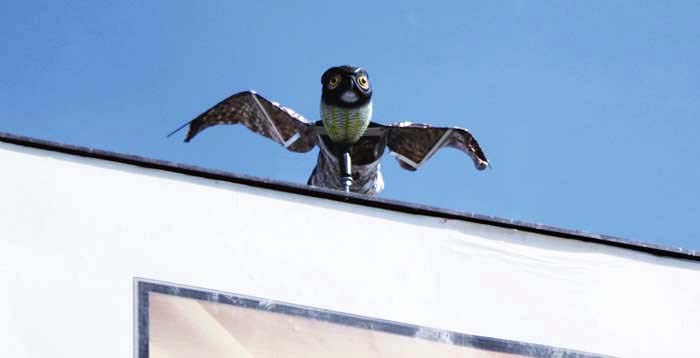It starts out as a soft hum from blocks away, steadily rising to a gutteral drone like radio static. As you get closer, it articulates into hundreds of individual, but still unidentifiable sounds. Finally, as you come upon the source, a derelict building tucked behind St. Mary’s, attached to the Gladstone Senior Residence, it becomes the unmistakable cooing and thrumming of wings of hundred of flocking pigeons.
Often referred to as sky rats, or rats with wings, pigeon populations love urban environments in which rooftops and building ledges mimic their natural cliffside habitats. They also love the year-round abundance of food that comes with dumpsters and general human untidiness and/or intentional generosity.
Under favourable urban conditions one pair can produce several generations of offspring, up to 50 individuals, in a single year.
Their presence is not universally despised however. Many people take great pleasure in feedng the multi-coloured birds. Street vendors in Trafalgar Square, London, England have long made a living selling bags of pigeon feed to tourists. The practice became the subject of a beloved song from the film Mary Poppins.
That, of course, adds to the problem. Venice has actually banned feeding pigeons in parts of that Italian city.
Yorkton is no exception. We have a problem and as the weather improves the hot spots become even more evident. The loading bays at the inactive Western Grocers warehouse, just across from Yorkton’s skate park is covered in mounds of feces.
Richard Swallow of Riva Specialized Cleaning Services and Pigeon Control said fecal matter can create an awful stink and even cause health problems.
Swallow was in Yorkton in February at the invitation of the Yorkton Business Improvement District to work with local businesses on mitigating the problem.
“It’s also a visual issue,” Swallow said. “If you’ve got a business that’s got crap all over their signage, on their front steps before you even get in the building, it’s an image issue.”
During his visit, Swallow did an initial assessment of the problem and provided a report to YBID a couple of weeks ago, but it didn’t contain any details on what kind of Yorkton-specific strategy could be employed or how much it was going to cost.
“I was a little disappointed,” said Phil de Vos, president of YBID. Swallow is returning to Yorkton tomorrow, however, to do a more thorough investigation and provide some numbers.
De Vos said the YBID board would have to wait and see what kind of money will be involved before it can determine what might be done.
Bob Maloney, Yorkton mayor, said outside of City of Yorkton property, there is not a lot the City can do directly. He did say, however, that where there is a public nuisance, as in the case of the Western Grocers property, the city will take action.
We’ve issued a clean up notice to the owners of the property to remediate or else we will have it done and the charges will go on taxes,” he said.
Maloney is hoping to see that building change hands with a local buyer.
“I know people have looked at the building,” he said. “At this point in time, the asking price is more than they were prepared to pay, but if we could affect a local sale then I think the problem would look after itself because the new owner would look after it, but we have issued a clean up order.”
Following Swallow’s initial visit some businesses haven taken some initial steps. One downtown business has put up owl decoys to scare pigeons off. Another downtown property owner is installing anti-roosting spikes.
Maloney said the city is monitoring the situation and has not ruled out a more active role in the mitigation process.
“I’m not averse to the City getting involved if we have to because it’s a real problem and you can’t have a bacteriological issue on city sidewalks and at some point we may have to get involved,” the mayor said.



